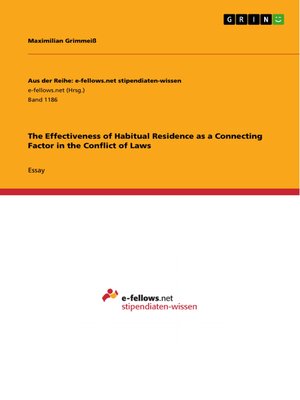The Effectiveness of Habitual Residence as a Connecting Factor in the Conflict of Laws
ebook ∣ Aus der Reihe: e-fellows.net stipendiaten-wissen
By Maximilian Grimmeiß

Sign up to save your library
With an OverDrive account, you can save your favorite libraries for at-a-glance information about availability. Find out more about OverDrive accounts.
Find this title in Libby, the library reading app by OverDrive.



Search for a digital library with this title
Title found at these libraries:
| Library Name | Distance |
|---|---|
| Loading... |
Essay from the year 2014 in the subject Law - European and International Law, Intellectual Properties, grade: First Class Honors, Trinity College Dublin (School of Law), course: Conflicts of Law, language: English, abstract: Habitual residence as a connecting factor enjoys popularity in the Hague Conventions and Rome regulations. Insofar it has to be considered a successful concept that took hold in the realm of private international law, but being successful in the sense of being used in different regimes and various legal instruments does not equal being effective. In this essay the arguments of the changeability of the concept as a reflection of the modern world will be looked at alongside the ordinary meaning approach. Further there will be consideration on the possibility of one being without a habitual residence, the accusation of habitual residence being an underdeveloped concept and questions on the uniformity within the common market.







